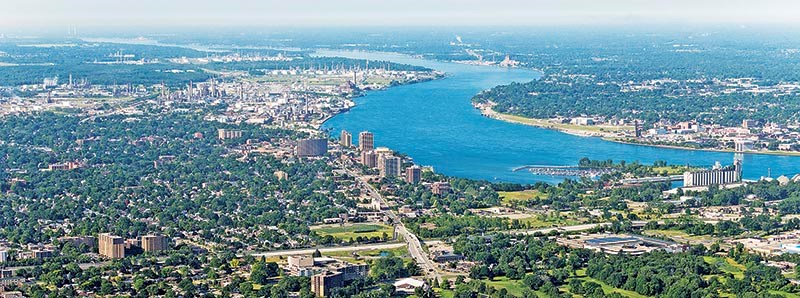Troy Shantz
Ottawa is helping Sarnia prepare for the impact of climate change.
The city is getting $10.4 million to continue separating its old sewers in the face of increasingly severe storms and the risk of flooding.
Ending discharges of raw sewage to the St. Clair River by untangling Sarnia’s storm and sanitary sewers has been called the largest engineering project in the city’s history.
The new funding announced last week will go to the next phase of the project, said Sarnia Mayor Mike Bradley, who called it “a giant step forward” for residents and the Great Lakes.
The grant through the Disaster Mitigation and Adaptation Fund will upgrade the Wellington and Devine street drainage area, said city engineer Pratt Rawat.
It will replace up to 6.5 kilometres of linked storm and sanitary sewers buried under Cromwell, Cobden and Cameron streets, as well as Forsythe, College, Euphemia and parts of Vidal and Mitton.
Aging infrastructure will be renewed as part of the project, which city staff say could cost $26 million over 10 years.
The effort will also reduce the risk of basement flooding when heavy downpours overwhelm the sewer system.
Sarnia has separated and replaced about 20 kilometres of combined storm and sanitary sewers since 2004. When the next phase is done, about 14 kilometres of the problem sewers will remain, Rawat said.
City Hall is also creating a new position to prepare for climate change.
The role, filled internally, will task a staff member with developing a plan and recommendations for the city’s strategic plan, official plan, zoning bylaws and infrastructure management, the city said.
The contract position will be funded by a two-year, $125,000 grant from the federal government and the Federation of Canadian Municipalities.
Sarnia will contribute about $16,000 annually for two years.
Tammie Ryall, acting director of community development, services and standards, said that person will develop a climate change adaptation plan, with specific recommendations for the city and its residents.
“(The Federation) identified that a lot of municipalities don’t take action on climate change… so this is intended to fill the gap,” she said.
